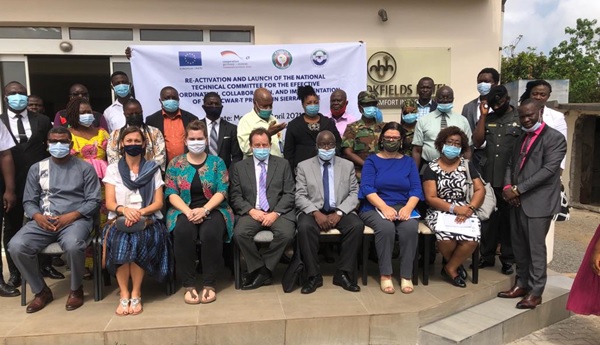OCWAR-T Project in Sierra Leone.
Venue: the New Brookfield’s Hotel, Freetown
Date: Monday 19th April 2021
CHECK AGAINST DELIVERY
Salutations
- Col (Rtd) Saa Sinah, Deputy Commissioner, Sierra Leone National Commission on Small Arms (SLeNCSA) and chair of the OCWAR-T National Technical Committee
- Honourable representatives of all National Authorities here represented
- His Excellency the Ambassador of Germany in Sierra Leone Horst Gruner or Patrick Dzierzon – Deputy Head of Mission
- Colleagues from the GIZ Office and the United Nations Development Programme (UNDP)
- Distinguished Guests
I am delighted to join you for the launch and first meeting of the National Technical Committee of the “Organised Crime West African Response to Trafficking” Project in Sierra Leone.
The European Union is a major player in global efforts to prevent and combat the uncontrolled accumulation and proliferation of small arms and light weapons (SALW). To be precise, the EU was among the first global actors to recognize the negative impact of uncontrolled arms proliferation on security and development in many regions of the world.
Efforts to address small arms proliferation has indeed been key to the EU’s foreign policy objectives since the 1990s’ and remains at the core of our partnership for peace, security and governance both with the African Union and the Economic Community of West African States (ECOWAS). As part of these efforts, the EU provides funding to various initiatives to counter illicit trade of SALW and supports the implementation of multilateral instruments such as the Arms Trade Treaty (ATT).
In West Africa, the threat from organised crime – be it trafficking of small arms, drugs or human beings – is substantial, challenging peace, progress towards rule of law and ultimately compromising economic and human development.
Ladies and Gentlemen,
In October last year, ECOWAS, the European Union and the government of Germany entered in a dynamic partnership to step up the fight against organized crime in West Africa. Together they launched 3 transnational projects to support ECOWAS Member States in their efforts to counter criminal activities: OCWAR-C to tackle cybersecurity and cybercrime, OCWAR-M to address money laundering and terrorist financing and OCWAR-T to combat organised crime and trafficking.
One of the strategic objectives of the OCWAR project – which is coordinated by GIZ – was to step up efforts to control the illicit flow of arms and increase national capacity to do so.
In this context, the OCWAR-T Project is a continuation of the ECOWAS/EU Small Arms Project currently implemented in Sierra Leone by the UNDP in collaboration with the National Commission on Small Arms (NATCOM).
Col (Rtd) Saa Sinah,
The European Union has followed with interest the progress achieved under the project so far, not least the seizure and destruction of small arms by rural communities in the border districts of Falaba and Kailahun in October last year.
I wish to laude the Sierra Leone National Commission on Small Arms (SLeNCSA) and UNDP as well as all parties involved – the Office of National Security (ONS), the Sierra Leone Police (SLP), the Republic of Sierra Leone Armed Forces (RSLAF) and local leaders – for the results achieved under the ‘Weapons for Development’ Initiative.
Col (Rtd) Saa Sinah,
In light of Sierra Leone’s long and porous borders, preventing arms from being smuggled into or out of the country is a particular challenge. This is especially the case with movements of small numbers of arms.
In this context, I am aware that mobility has hindered the Commission’s capacity to monitor the country’s border areas. It is our hope this new phase we are launching today will allow the Commission to further enhance and consolidate its capacities in view of effective border management and tracking of weapon movements.
In particular, it is our hope that the programme will succeed in supporting the National Commission to establish a sound framework for weapon marking and registering.
Distinguished Members of the National Technical Committee,
As you convene today for the first time to discuss the OCWAR-T national action plan, let us remember that we can only fight organised crime if we work closely together.
The “ECOWAS/EU Small Arms Project” has shown that for the management and oversight of conventional arms transfers to be effective, there is the need to strengthen not just the National Commissions, but also the capacity of and partnership with a wide range of different actors.
We therefore encourage you to work closely with law enforcement agencies and civil society in fighting the broader array of organised crime networks but also to establish a close collaboration with your regional counterparts, here included the Regional Centre on Small Arms and Light Weapons (RECSA), the United Nations Regional Centre for Peace and Disarmament in Africa (UNREC) and Interpol.
Notably, the weapon marking and registering system established under the National Commissions in the ECOWAS region shall complement and reinforce the existing Interpol “Illicit Arms Records and Tracing Management System”.
As we look at the future, we further encourage the technical committee members and implementing partners to enhance collaboration with police and security forces, to strengthen safeguards against corruption and ensure adequate communication.
It is our hope that by the end of the programme we will have contributed seizing at least 1000 illegal weapons in each ECOWAS country.
Distinguished guest,
let me close here, by applauding the commitment of national authorities, ECOWAS and our implementing partners GIZ and UNDP, and let me wish all participants a most successful event today.
Thank you!


